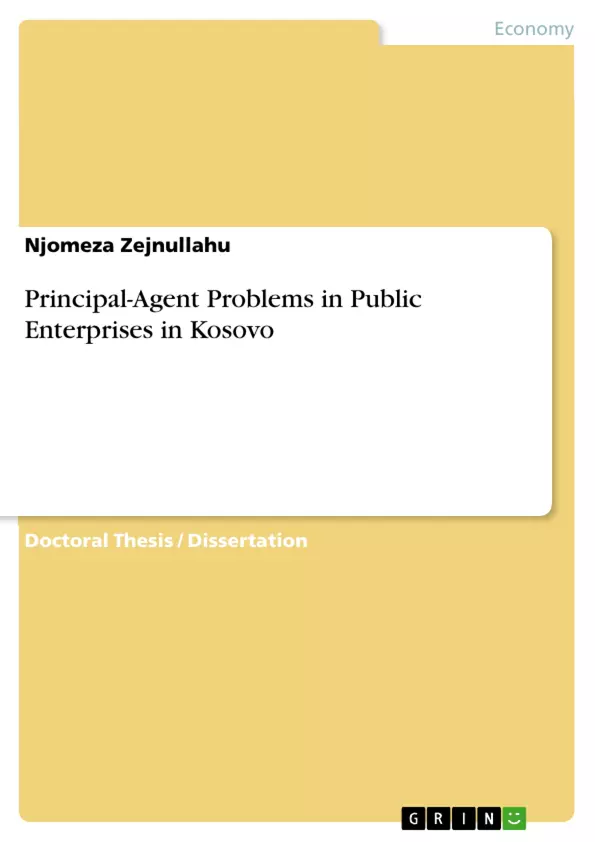Publicly Owned Enterprises (POEs) in Kosovo are present largely in the market, with a focus on sectors such as electricity, railways, telecommunications, waste management, etc. This presence is followed by the constant need for subsidies from the government and weak financial and commercial performance. POEs in Kosovo are faced with numerous challenges including weak governance and management. Agency Theory is used widely as a tool with which to explain governance and functioning of organisations and companies. In addition, Agency Theory is used to explore relations between stakeholders in politics and the economy.
This study first elaborates upon the applicability of Principal–Agent Theory in POEs in Kosovo and then identifies the presence of principal–agent problems and identifies the nexus between such problems and poor performance of POEs. Identification of principal–agent problems may help to identify the reason for poor performance of POEs and the lack of transparency, accountability and supervision. POEs are subsidised by the state on an annual basis, which makes the identification of problems in having profitable POEs important for public interests, too. Such importance is due not only to the fact that POEs are financed by taxpayers but also to the fact that they are supposed to provide services in public interests by being self-sustainable and profitable for the government as a shareholder.
The study aims to conclude that principal–agent problems such as capture, rent-seeking, moral hazard, information asymmetry and adverse selection are present in POEs in Kosovo, and that they have a negative impact on their performance. Such principal–agent problems and their negative performance may also be influenced by gaps in legislation and weak law enforcement.
Inhaltsverzeichnis (Table of Contents)
- DECLARATION OF AUTHORSHIP AND INDICATION OF THE PROOFREADER
- Abstract
- List of Abbreviations
- List of Tables
- List of Figures
- List of Graphs
- 1 INTRODUCTION
- 1.1 BACKGROUND
- 1.2 RESEARCH PROBLEM
- 1.3 PREVIOUS RESEARCH ASSESMENT
- 1.4 RESEARCH METHODOLOGY
- 1.4.1 Sampling
- 1.4.2 Data collection and analysis
- 1.5 OUTLINE
- 2 AGENCY THEORY AND AGENCY LAW
- 2.1 AGENCY THEORY AS RATIONAL CHOICE
- 2.1.1 Definition of Rationality
- 2.1.2 Rational Choice Theory
- 2.1.3 Resourceful Evaluative Maximising Model (REMM)
- 2.1.4 Pain Avoidance Model
- 2.1.5 Public Choice
- 2.2 PRESANTATION OF THE AGENCY THEORY
- 2.2.1 Theoretical Approaches to Agency Theory
- 2.2.2 The Positive Theory of Agency
- 2.2.3 Principal-Agent Theory
- 2.2.4 Principal-Agent Problems (PAPs)
- 2.2.5 Applicability of Agency Theory in Public Enterprises
- 2.3 THE LAW OF AGENCY
- 2.3.1 Relationship between the Principal and the Agent
- 2.3.2 Agency Law in Kosovo and Slovenia
Zielsetzung und Themenschwerpunkte (Objectives and Key Themes)
The research focuses on the application of Principal-Agent Theory in Publicly Owned Enterprises (POEs) in Kosovo. It investigates the presence of principal-agent problems and their impact on the performance of POEs. The study aims to understand why these enterprises often struggle with weak governance, management, and financial performance, despite receiving substantial subsidies from the government.
- Applicability of Principal-Agent Theory in POEs in Kosovo
- Identification and analysis of principal-agent problems in POEs
- Correlation between principal-agent problems and poor performance of POEs
- Role of legislation and law enforcement in addressing principal-agent problems
- Impact of principal-agent problems on transparency, accountability, and supervision in POEs
Zusammenfassung der Kapitel (Chapter Summaries)
The first chapter introduces the background of the research problem, reviewing previous studies on the topic. It outlines the methodology employed, including the sampling strategy and data collection methods. The second chapter delves into Agency Theory, exploring its theoretical foundations and practical applications. It examines various theoretical approaches to Agency Theory, including the Positive Theory of Agency and Principal-Agent Theory. The chapter also analyzes Principal-Agent Problems (PAPs) and their implications for public enterprises.
Schlüsselwörter (Keywords)
This research explores the relationship between State-Owned Enterprises, Agency Theory, and performance. Key topics include principal-agent problems, accountability, transparency, law, and the impact of these factors on the effectiveness of POEs in Kosovo.
Frequently Asked Questions
What are Principal-Agent Problems in Kosovo's public enterprises?
These problems include capture, rent-seeking, moral hazard, and information asymmetry, which lead to weak financial performance and mismanagement in state-owned sectors.
Why do Publicly Owned Enterprises (POEs) in Kosovo require constant subsidies?
Poor commercial performance, weak governance, and a lack of accountability often result in financial deficits that the government must cover with taxpayer money.
How does Agency Theory explain the functioning of POEs?
Agency Theory explores the relationship between the government (principal) and the management of the enterprise (agent), highlighting conflicts of interest and monitoring issues.
What is the impact of legislation on POE performance in Kosovo?
Gaps in existing legislation and weak law enforcement contribute to a lack of transparency and allow principal-agent problems to persist.
What are the key sectors for POEs in Kosovo?
Public enterprises in Kosovo are primarily active in electricity, railways, telecommunications, and waste management.
- Arbeit zitieren
- Njomeza Zejnullahu (Autor:in), 2018, Principal-Agent Problems in Public Enterprises in Kosovo, München, GRIN Verlag, https://www.grin.com/document/1390631



